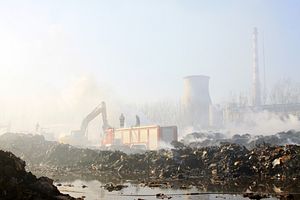The greatest advantage of China’s political system, in theory at least, is raw and liberating efficiency. Neither shackled to a partisan legislature nor lumbered with an uninformed electorate, the top leadership has remarkable power to pass big reforms when they are needed most. Yet even a cursory survey of the last thirty years shows that Party leaders rarely take advantage of this authority. Most often, decision makers spend years quietly researching and deliberating before introducing major changes.
In general, the first step for any new policy in China is a small-scale pilot program to gauge its potential as a nationwide initiative. This tradition of experimentalism dates back to Deng Xiaoping’s famous Special Economic Zones in the 1980s and still very much dictates the policy process. The ambitious Hukou reforms announced this year, for example, were vigorously tested ahead of time in experimental zones in Guangzhou. Likewise, before committing to judicial reforms that are expected to give more power to China’s judges, the Party has picked a handful of provinces to field test the new system.
In a country as large and uneven as China, testing new ideas on a trial basis could be seen as a generally pragmatic approach. However, with Beijing already working against a massive bureaucracy that obstructs change at the lower levels, this system also makes policy execution arduous and slow. While in a world with unlimited time all policies could be perfected through trial and error, in reality, certain reforms require decisiveness and sweeping action. In China, new environmental regulations to meet the country’s escalating pollution crisis are arguably the most urgent example. Yet true to form, Beijing has generally clung to cautious, incremental implementation even as the effects of nationwide environmental degradation compound.
In recent months, there has actually been a great deal of international praise for China over ambitious plans to improve its carbon footprint. Specifically, an official strategy to introduce a national carbon market by 2016 and bring down emissions by 45 percent has inspired optimism and even claims that China is outpacing the West in the fight against climate change. However, even if China succeeds in meeting these impressive targets, it will still be a long way from solving its environmental woes. Chinese leaders have been toying with cap-and-trade programs since 2011, when carbon markets were launched in pilot cities like Shenzhen, Beijing and Shanghai, yet air pollution in these cities has remained extremely hazardous. Meanwhile, recent revelations about the contamination of China’s waterways and soil demonstrate that carbon emissions are just the tip of the iceberg.
There is no question that establishing environmental standards takes time. As Chinese leaders often point out, all post-industrial states emerged from comparable periods of high-pollution and scant regulation, and many argue that China is still in this adolescent phase. Yet the frustrating contradiction is that leaders have also proven capable of incredible efficiency when environmental regulations bring political capital. The pace at which Beijing shuttered factories before the Olympics, and more recently slapped taxes on coal, shows how quickly leaders can effect change when motivated by public pressure.
Yet to forestall more serious, systemic environmental issues, Beijing will have to be preemptive rather than reactive with regulation. In everything from modernizing its recycling industry to improving regulations on rare earth mining, the costs of waiting and testing out new ideas are high. Especially in terms of human health, delays from experimenting with environmental reforms are almost guaranteed to be more harmful in the long run than the initial errors from launching untested policies. The size of China’s population coupled with its energy-intensive, industrial economy makes fast action to minimize human impact all the more essential.
Encouragingly, once Beijing feels confident throwing itself behind environmental reforms, huge strides can be made in very little time. The eagerness with which leaders have embraced renewable energy is a clear example. However the clean energy industry is also a huge source of jobs in China and helps reduce the country’s dependence on foreign fossil fuels; many of the most sorely needed environmental regulations will not have this economic or strategic benefit. Instead, most will demand stricter standards for industry that will raise costs and cut into profits. Especially as China’s economy begins to cool down, it is unlikely that leaders will feel much enthusiasm about taking these steps.
Like rebalancing the economy, introducing environmental regulations in China will be a painful process. But it is also one where disruptive action now could help contain larger problems in the not so distant future. China can perhaps afford to move more gradually when it comes to maturing into a modern and diverse economy. But to protect its environment and preserve its already limited land resources, Beijing needs to be willing to take a stand now.
Zach Montague is a research analyst at the Delma Institute, specializing in East Asian politics. He holds a degree in China & Asia Pacific Studies from Cornell University and has previously worked in Washington, Beijing and Xi’an. Follow him on Twitter @ZJMontague.

































